Sandians donate to programs that train dogs to assist their owners and communities
Sandians love animals. This is evident every year during ANGLE’s Homeward Bound Drive when the workforce donates hundreds of pounds of pet food, toys and puppy pads to various agencies that help animals in need in the Albuquerque area. Dogs are cute and cuddly, they provide protection and they’ve even become co-workers while we telework, occasionally offering a hearty bark right in the middle of an important Teams meeting. But they can be more than a pet. Several agencies, supported by the United Way of Central New Mexico, use dogs to help children and adults process trauma through emotional support as well as assist people with disabilities to perform essential tasks that improve their quality of life and increase independence.
Sandian steps up as a puppy raiser and dog handler
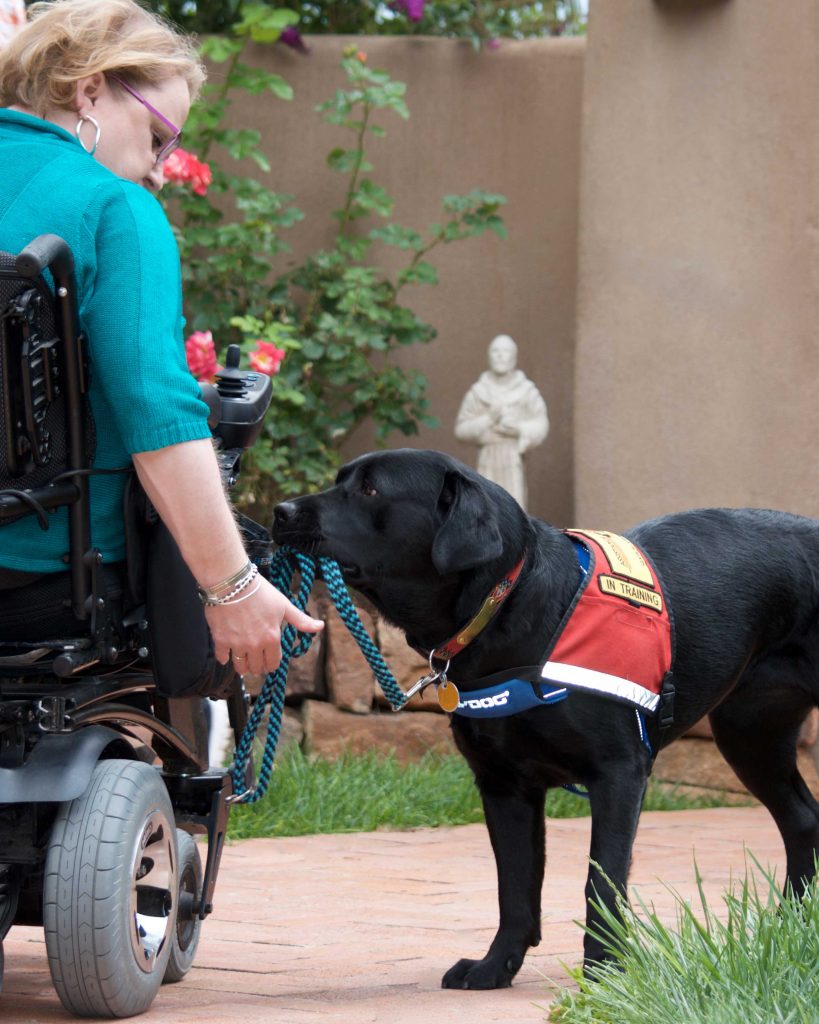
Sandian scientist Mary Moya has been involved with Assistance Dogs of the West since 2010. This program trains and places facility service dogs, courthouse facility dogs and crisis response canines. These highly trained assistance dogs are placed with professionals in criminal justice, crisis response, first responder, victim advocacy, mental health, physical health and occupational therapy settings as well as children’s advocacy centers.
Mary’s official title is puppy raiser and dog handler. The dogs live with the trainers and learn everything they need to know for their jobs during the week, and the puppy raisers keep them on the weekend. Mary is given instructions on tasks to work on over the weekend that reinforce their training, like picking up items off the floor and being calm. “We also take the dogs with us when we go into public, like to the credit union, grocery store, sporting events and church so the dogs get exposed to different venues and people,” Mary said. The dogs can be trained to pick things up for a person that is in a wheelchair. They can also learn to pull doors and dresser drawers open to help their person get dressed.
“We have a number of dogs all over the country that we’ve helped train and they go off into the community and do great things,” Mary said. She has helped raised dogs that work for the FBI, dogs that work in San Bernardino, California and Roswell, New Mexico and a few dogs that work in Albuquerque, including Cassie who works for New Mexico Kids Matter. “She was one of our puppies,” Mary said. “We helped raise her and when she was ready, she graduated and went to work for the CASA Program.”
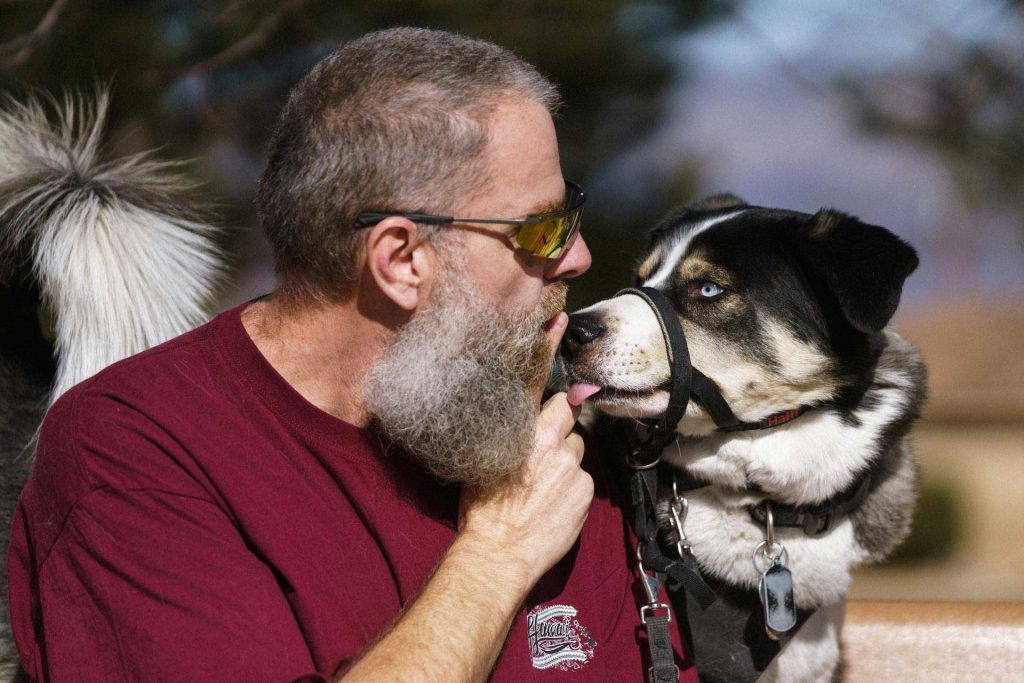
The facility courthouse dogs have a positive impact and help bring people together during contentious and tense situations. Mary said the dogs “make such a difference in the courtroom because without the dog, the lawyers are against the judge, the judge is against the lawyers and the defendant is against the prosecution, but when the dog is there, everybody breathes a sigh of relief, and it makes a whole difference in the atmosphere of the courtroom.”
Mary said it is a rewarding experience but also challenging when the training is complete, and the time comes to say goodbye. Assistance Dogs of the West hosts a graduation ceremony so the trainers and puppy raisers get to know the person the dog has been placed with. During the ceremony, the owners speak about how the dog has impacted their life. “I think when you see what a difference you’ve made for people, there’s no way you could keep the dog after that,” Mary said.
Comforting children under extreme stress
New Mexico Kids Matter is an agency in Albuquerque that advocates for children who have been abused or neglected. They train volunteers, Court Appointed Special Advocates, who work with a child’s family, teachers, doctors, caregivers and anyone else involved in the their life to help make independent and informed recommendations to help the judge decide what’s best for the child.
Sometimes, children in foster care must appear in children’s court or criminal court, which can be scary and stressful. That is when service dogs like Cassie and Nicole are there to help. Michelle Gonzalez manages the COMPASS program for New Mexico Kids Matter and works as a handler for Cassie and Nicole, two vital members of the team who happen to be very special Labrador retrievers.
Cassie and Nicole’s jobs are to accompany children in court so they have a friend to pet and help them feel safe and calm. A child can be in court due to termination of parental rights or hearings about their cases every six months.
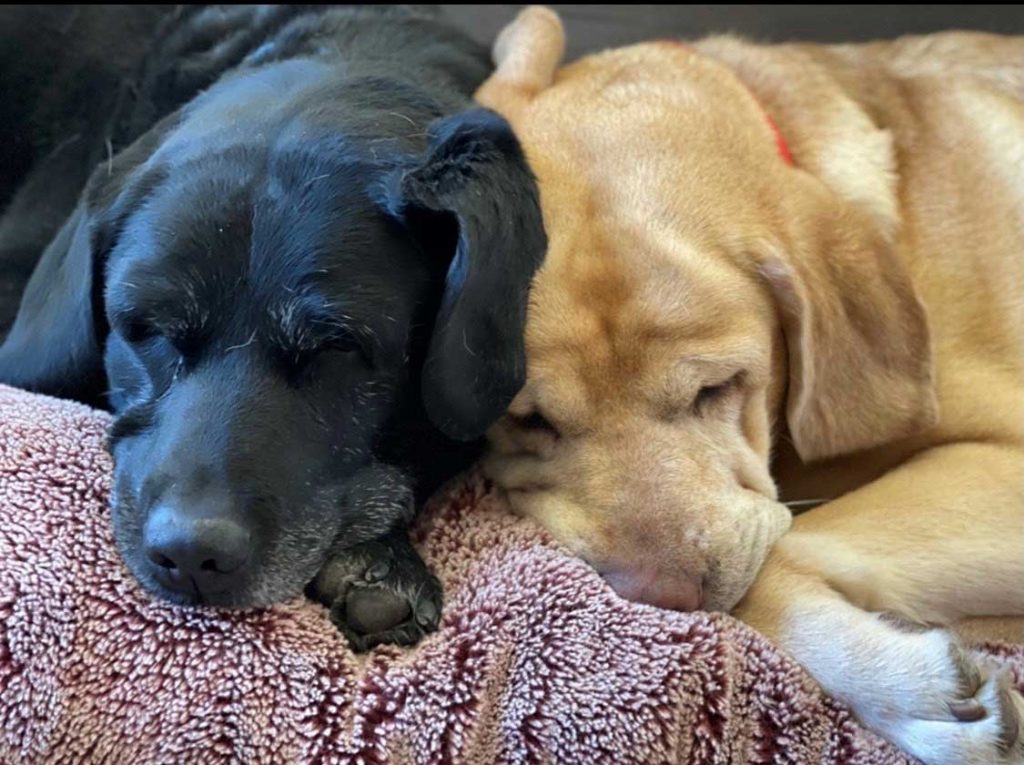
Cassie is a 10-year-old black Lab and Nicole is a 6-year-old yellow Lab. Both dogs were raised and trained by Assistance Dogs of the West. “Cassie is meant for court and works with people who are having emotions or some type of trauma,” Gonzalez said.
Gonzalez relayed the story of Cassie’s support at a court hearing for the termination of parental rights. In this case, two children testified against their mother. “Cassie knew that the little girl really needed her, and she crawled under the cramped podium and laid across her feet. And then when the little boy came to testify, Cassie would not hold still and seemed agitated,” Gonzalez said. “She picked up her leash and she walked over to the mother, who was crying, and laid across her feet. Cassie knew that the mom was sad, and that she needed to go and give her comfort.” This story sticks out to Gonzalez because the mother deserved support and compassion, and Cassie provided that to her in a difficult moment.
Nicole’s strength is children’s court. She loves kids. She wiggles a lot and plays with them. Both dogs choose who needs support, even in the New Mexico Kids Matter office staff. Sandia’s community involvement team looks forward to the Holiday Gift Drive every year in December because they get to interact with Cassie and Nicole. “In years past, when we were collecting gifts in-person, one of our highlights was interacting with Cassie and Nicole,” community relations specialist Roberta Rivera said. “It’s a chaotic time and the dogs really do ground you.”
“I like to say they are there for everybody. They walk into the courtroom, the attorneys get on the floor with them, the workers interact with them and the judges love them,” Gonzalez said. Cassie is nearing retirement and deserves some rest after all the emotion she has taken on during her work. She will spend her golden years with Veronica Montano-Pilch, executive director of New Mexico Kids Matter.
The money that comes from the United Way helps New Mexico Kids Matter programs grow their staff and recruit more volunteers to become CASAs. “Our volunteers are incredible and with more volunteers, we can advocate for more children in foster care, support them and give them a voice,” Gonzalez said.
Saving lives two at a time
Lindsey Kay founded service animal training program Paws and Stripes in 2010 out of her passion for dogs and love for her country and service members. Kay was inspired to create the program by a veteran family member who suffers from post-traumatic stress disorder and traumatic brain injury. She researched multiple organizations, but the cost of service dogs was too high — more than $60,000. She created Paws and Stripes to provide service dogs to veterans at no cost. All dogs in the program are rescued from animal shelters.
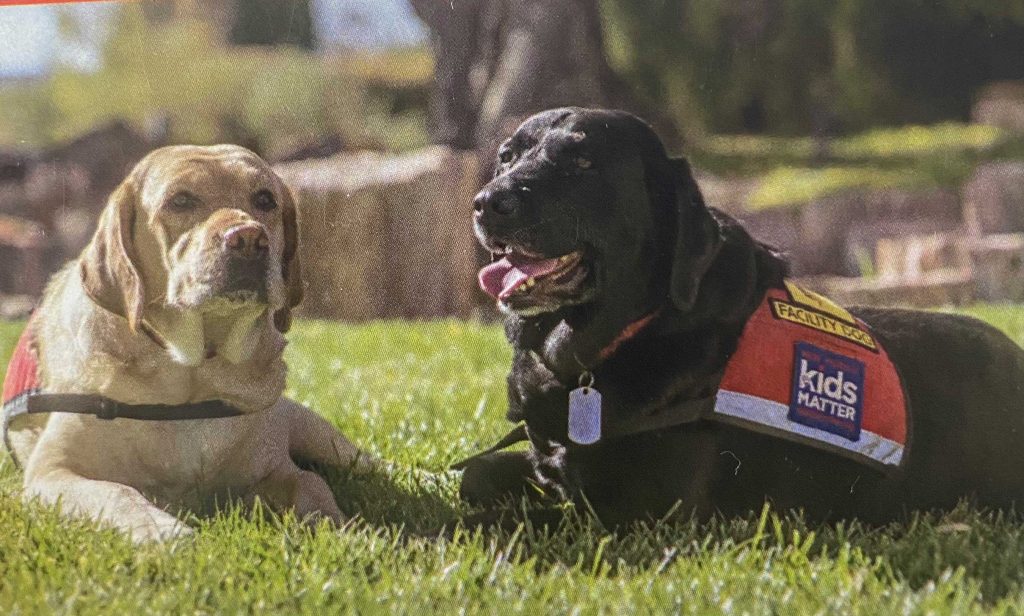
The Paws and Stripes program is 15 weeks and includes weekly training sessions, group classes, workshop lectures and mental health counseling. After graduation, veterans adopt a fully trained service animal to help them recognize the onset of symptoms and triggers and alert them to increasing pain levels. They awaken handlers from nightmares, provide medication reminders and assist in public settings.
Jasmin Perry, development manager at Paws and Stripes, said other programs in the country do similar work, but “what’s different about us is that instead of giving the dog to the veteran already trained, we go through the entire training process together, so it’s actually a bonding experience.” Veterans are able to choose their dog once Paws and Stripes have selected dogs from the shelter that meet their criteria. To qualify as a service dogs in their program, they must be able to help with mobility, alert the owner of medication reminders and serve as a buffer between the veteran and society.
Cassie and Nicole have different personalities and approaches to the people they help. Cassie supports both children and adults who are pressing charges against someone who hurt them earlier in their lives. “If they can feel that you’re having a hard time and can feel that you are struggling, they’re going to go to that person,” Gonzalez said. “Cassie does a little nudge on your hand when she feels that you need extra support, and Nicole does a really good job of laying across your feet or putting her head on your legs.”
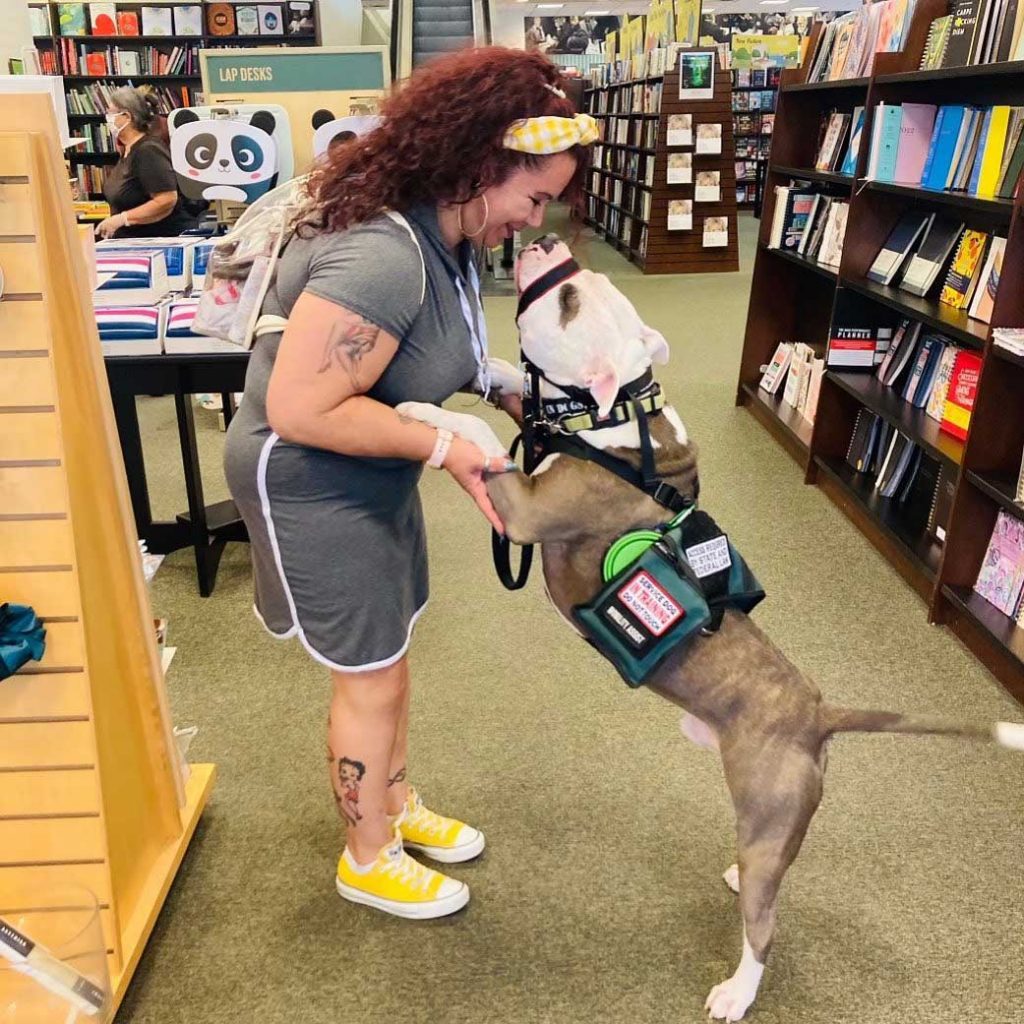
Veterans in their program experience post-traumatic stress disorder, traumatic brain injury and military sexual trauma —sometimes all three. Many have also been injured during combat and need help with mobility.
“We’ve seen an uptick with our veterans needing mental health services recently with everything going on in the world,” Perry said. “They sometimes need help just getting out of bed. Some veterans need medication reminders because they have PTSD, depression and anxiety and they forget about their own health,” Perry said. “The dog can remind them to take the medication they need.”
Dogs in the Paws and Stripes program work for up to 10 years. When dogs in the program die or retire, veterans can rejoin the program to adopt a new dog. Retired dogs stay with their owner.
“Here in New Mexico, we have a really bad problem with illegal breeding. Many dogs end up in shelters and only have a certain amount of time to be adopted before they’re euthanized. We’re also saving these shelter dogs who in turn are helping save veterans’ lives. We’ve seen that, since having received these dogs and completing our program, 50% of suicidal tendencies have gone down in our veterans.
“In New Mexico, we have the largest veteran community per capita in the nation. And we’re top in the nation for veteran suicide, so though it may seem that giving money out of your paycheck may not make a difference, it could quite literally be saving a life,” Perry said.
Paws and Stripes uses funds from donations, including those from United Way, to pay for veterinary visits, dog food and supplies, trainers and the certification of dogs, as well as expanding mental health services and substance abuse programs for veterans.
Each contribution matters
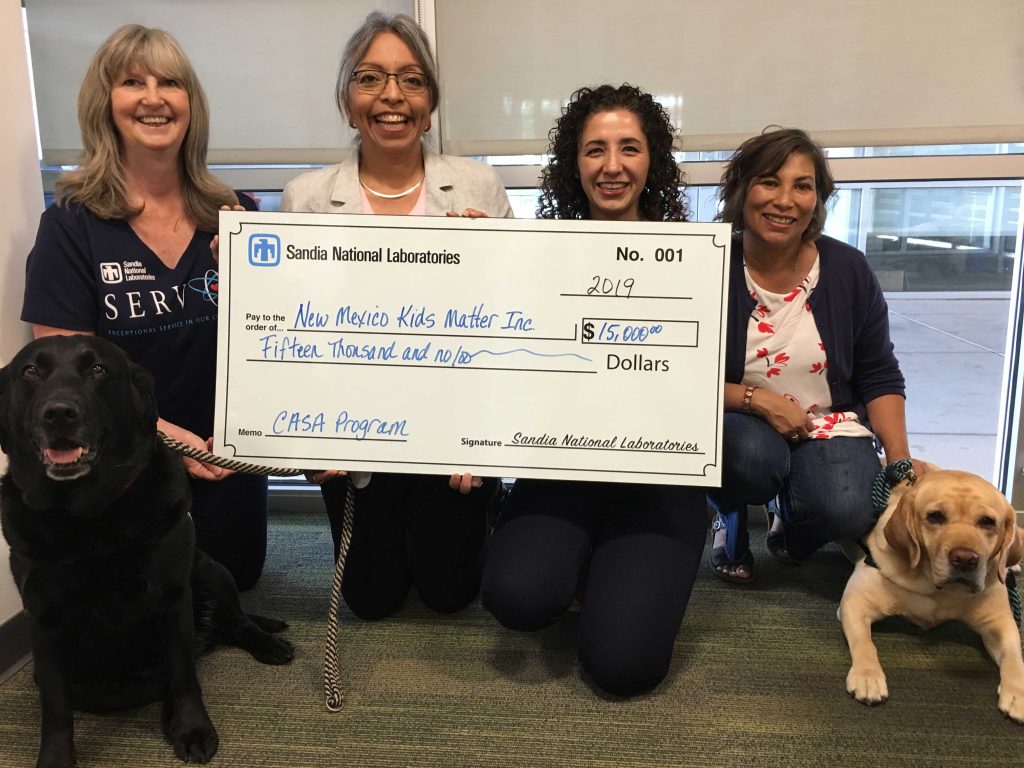
These agencies share more than dogs helping humans with emotional and physical needs. They have all received funding from the United Way of Central New Mexico to support their important work. The Sandia Gives campaign starts October 4. Sandia makes it easy to support our communities by conveniently giving to through the United Way of Central New Mexico using payroll deductions. Sandians can allocate their donations to United Way or choose to give to other charities that support our communities.
Enrolling in the Sandia Gives campaign is a simple way to give for the first time. There are a variety of initiatives that these donations support: helping a person with a disability get a trained assistance dog, helping a single mother learn how to read so she has a better chance of keeping a job, increasing a community’s access to nourishing food and many others. Together, Sandians can support nonprofit organizations that provide vital services to the people in the communities where we work and live.